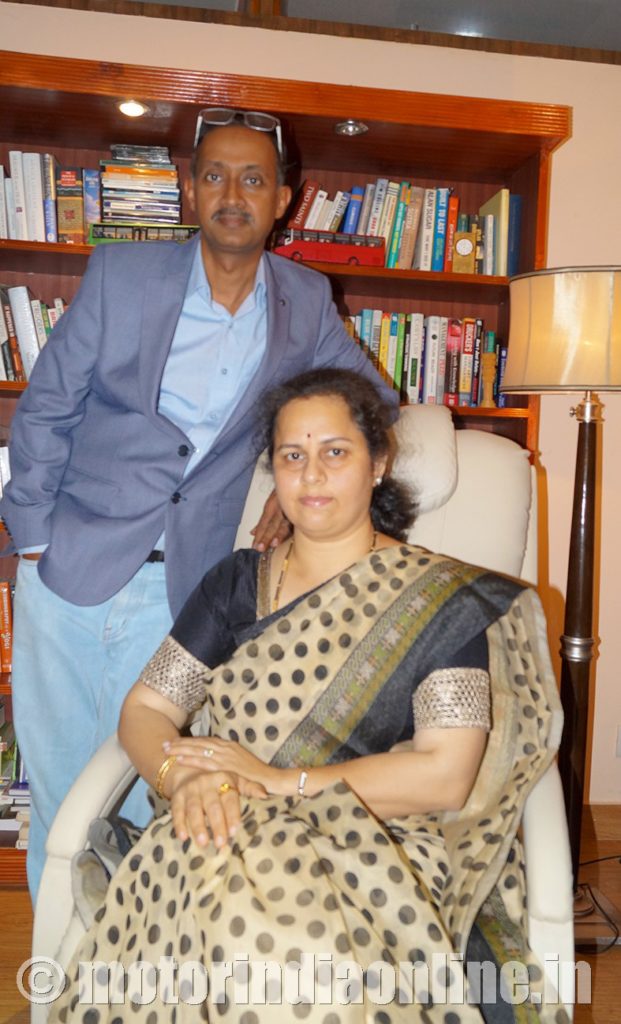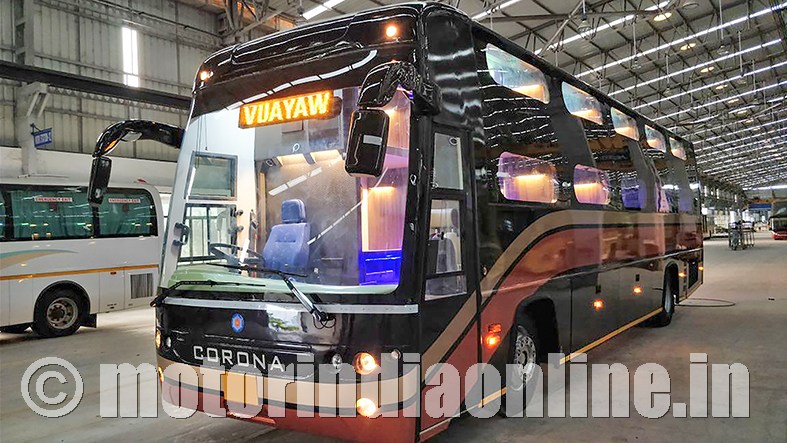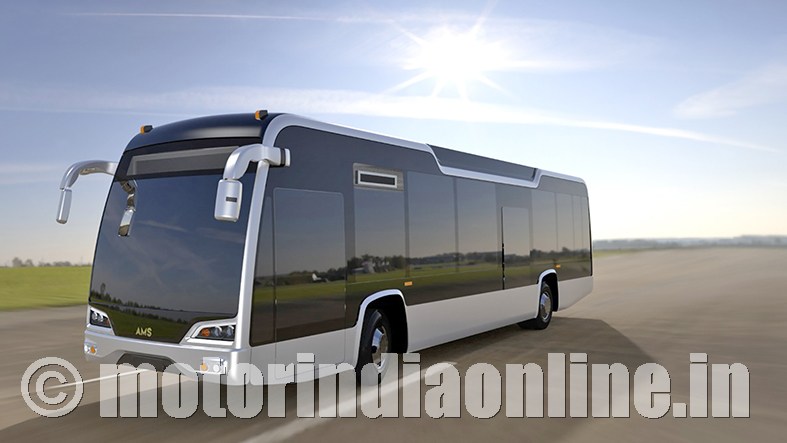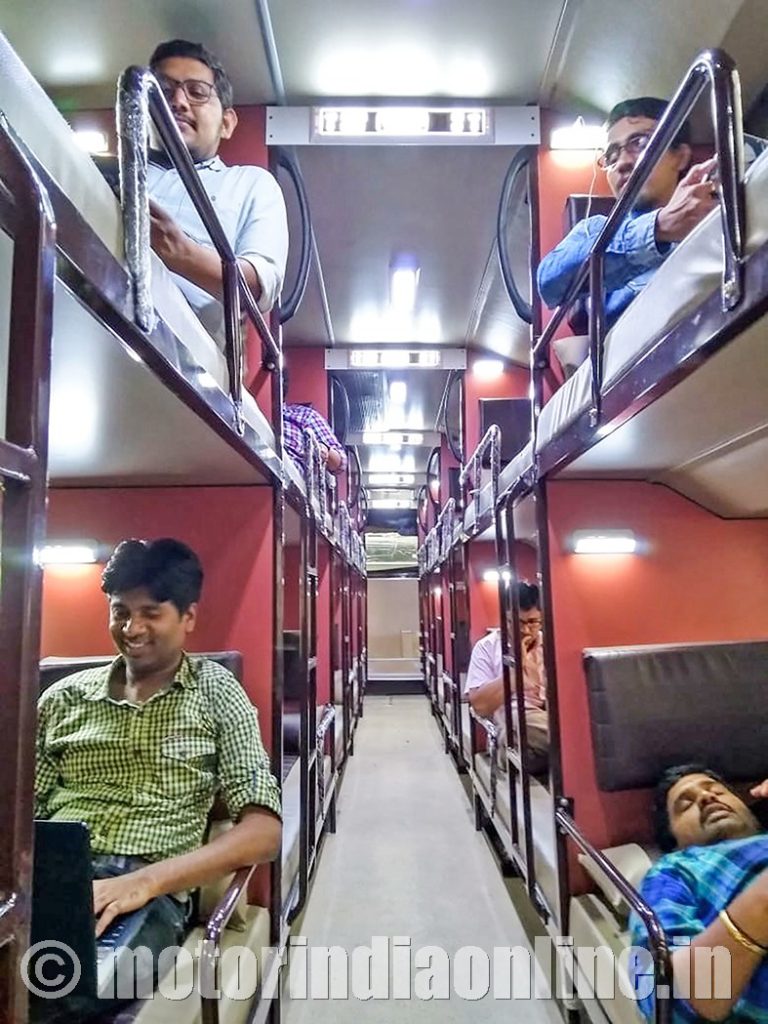The chemistry between two people resulting in a noteworthy synergy is well illustrated by the duo of Mr. Balaji Rao and Ms. Sowjanya, Founders of GroupSynergy. The former, a mechanical engineer, and the latter, an MBA in Finance, have been running GroupSynergy, a corporate advisory and management consulting firm headquartered in Hyderabad, since 2005.

In a candid interview to MOTORINDIA, the founders talk about the prospects of electric vehicles for mass transportation, GroupSynergy’s role in the same, their company’s unique set of offerings for clients, and more.
Excerpts:
Could you start off by telling us how GroupSynergy came into existence and how your journey has been thus far?
Balaji: GroupSynergy was started in 2005. Prior to that, I had worked with Ashok Leyland, Castrol and Tata Motors where consultants like BCG and KPMG were involved for specific projects or assignments. We observed that there were a large number of Indian companies that really require hand-holding but could not afford to use the services of large consulting companies. We thought ‘why don’t we pitch in?’, and GroupSynergy took birth. Synergy Management was what the small and medium Industries would require in terms of right technology, identifying partners, strategic planning, arranging for funding and hand holding them through the new processes, systems procedures right from the product planning stage, manufacturing and leading to the market – up to the dealer level.
Sowjanya: As of date, we have worked for 33 companies, across various industries and product segments. As a management consultant, we realized that for the client’s success, training them on the processes and methods we advocate was paramount, hence we even got into the class room. We have clocked more than 50,000 man-days of training within a span of 4 years, 2005 to 2009. The training is from the classroom to the actual workplace. We have worked across industries – automobiles, engineering, auto components, tyre, foundry, engineering, cement, medical devices, power, telecom and financial services.
What are the solutions & services you offer to the truck, bus and component sectors? Which are your main areas of interest and expertise and what are the main reasons auto companies prefer partnering you?
Balaji: From driving business efficiency to spearheading the business, Corporate Management and advisory services being our forte. From ‘Ideation’ to establishing the Business, with strategy formulation, technology collaboration, manufacturing process and marketing functions, we hand hold the client to success.
Sowjanya: To elaborate, Deccan Auto is our brain-child to create high-end luxury buses in India. Right from the choice of the industry to the technical collaboration and the plant design is our creation. In the past we were instrumental in creating process efficiency and systems at Hyva, Piaggio, M&M (Auto + Tractor), Tata Motors, L&T, Bosch, AMW, Lombardini Engines and BKT Tyres. At Hyva India Ltd. our key focus was on process improvement through 5S and Kaizen.
We have created and implemented the sales process in Piaggio India, Mahindra & Mahindra Auto & Tractor divisions, Kotak asset Division, and BKT Tyres. In Piaggio, Bosch and GP Industries we have supported in HR process, PMS and Talent Management.
We have certainly created a niche for ourselves by the kind of exposure and experience we have gained in the bus, truck and component sectors. Our Expertise is in Execution and hand holding that we bring in along with the advisory resulting in sustained efficiency and performance.
How do you view the public transport in the Indian context?
Balaji: We felt there are certain solutions the country requires where we have the expertise to start pilot projects.
Electric buses are very critical and important for the Indian market for various reasons. Our public transport systems have their own drawbacks and people have been moving away from public transport buses and are using two-wheelers and other modes of personal transport.
City buses in most places are not in good condition. People would not really like to travel on such buses and choose other modes of transport instead. So we, as a country, have to work very hard to improve the modes of transport so that people move towards using public transport to reduce the oil consumption, traffic chaos and pollution.
In the same context what becomes more important is how do we encourage people to travel more often in buses. They are not comfortable, not on time and are overcrowded. If we have to see this from an economic point of view, this is a combination of being aspirational and yet frugal.
Can we give better transport facility and better buses without taking the pollution head-on or having heavy cost implications?
Balaji: Electric buses will solve two problems – one, the pollution and the second is travel comfort; an electric bus could accomplish the image of how a city bus really needs to be. This is an opportunity for us as a country to transform the public transport industry. This is like a blessing in disguise that has come to us not only in terms of fuel cost and pollution but as well as creating a good looking and comfortable bus. It is definitely possible for this scenario to work on an electric bus with the subsidy that is being provided by the Government. Within the next two years if we can have 10,000 electric buses on our roads, we would have changed the way the Indian transport system is currently working.
What about the feasibility of electric buses in India?
Balaji: On the face of it – it is feasible to launch and run electric buses in India. The first challenge is the price which the Government is trying to address with subsidies. It may not last for long, but it is definitely a good platform to kick-start the process. To address the price challenge, we need to get into the ‘Make in India’ mode very quickly. India has the talent, and expertise is available.
We need big ticket risk takers to put in their money into cell manufacturing. Our import bill will shift from crude to lithium. India has more than 200 good bus body builders. To catch on the price issue we need to leverage on this asset.
The other big challenge would be – from where do we acquire the power to charge these buses? Charging stations, the dedicated power supply and initial high Capex are the challenges. If the Indian companies do not react quickly, just as it has happened in the solar power generation, money and technology at low cost will enter India and give a big threat. This is what has blown the Indian solar panel manufacturing industry.
When it comes to electric mobility, how do you think it is taking shape and what role do you play in it?
Balaji: We are now spearheading an electric mobility project with our new company AMS Electric Mobility Ltd. engaged in making pure electric buses – 12 m and 9 m. Our first prototype will be ready very soon. We are working with companies that are interested in operating the buses for STUs.
Our buses will be positioned to optimize on the battery capacity based on the operations that the STU plans. We will also create the required charging stations. Apart from this, we are also engaged in talks with a few companies in other neighbouring counties which are interested in moving ahead with electric buses.
Sowjanya: When the industry is going through an inflection point, like in the public transport industry – from IC to electric, which quintessentially functions with regulatory/Government interventions, it makes sense to find synergies between drive manufacturers, bus manufacturers, bus body builders, battery manufacturers, operators and STUs. We are in talks with various start-ups which are pursuing their interest in electric buses but do not have the required infrastructure. We have opened the doors of Deccan Auto as a manufacturing base for such companies. Our monocoque bus is a very good design as a base for an electric bus.
Balaji: We have also put up the First Super capacitor manufacturing facility in India – SPEL Ltd. This will be operational from November. We believe the future of power storage will certainly be a combination of battery and super capacitors. There are a few companies mulling the idea of a supercapacitor-based bus in India. We are supporting them also.
Sowjanya: This is exactly what we at GroupSynergy are engaged in doing to bring a lasting solution to the new challenge of introducing electric buses for the Indian public.
Given all the recent changes happening in the market – GST, BS-VI emission norms from April 2020, axle load change, scrappage policy, etc. – how do you see the commercial vehicle space performing in the coming years amidst all these changing external factors?
Sowjanya: The commercial vehicle industry is not bound by the external restrictions but more by the demand factor. Whatever may be the restrictions and challenges, the commercial vehicle sector will find its way out. There might be small setbacks which are temporary, but the industry will sail through it. All these external factors are not going to hit the industry too hard.
Balaji: Commercial vehicles business has always been an indicator of the economic activity in the country. External factors which effect the economy will affect the industry. The axle load change is more a decision the Government has taken based on overloading that is rampant on the Indian roads. This decision is only going to legalize the activity and hence is not going to affect the demand nor the cost of transportation to a large extent. The scrapping policy will certainly bring in volumes, but we should also note that the vehicles that are to be scrapped are already doing the last-line connectivity at district levels and are not on the active transport network. Hence, the scrapping will first help improve the resale value of the vehicles which are ready to move from the main line activity to the district levels. The effect of the scrapping will be gradual and take some time to translate into new vehicle sales.
Can you throw some light on GroupSynergy publication?
Sowjanya: We have established a company to publish all the work that has been done by Synergy Management Advisors in the last 13 years. A total of 20 titles have been lined up, and the first book is being launched in November.
All the knowledge and wisdom generated from every project transforming into books will probably help more individuals. It is a combination of books, videos, play-books and software. Probably in an year’s time we will be ready with four more books.
_ by Raghuram Sharma.


